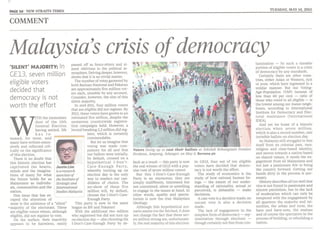Malaysia’s crisis of democracy
- 1. PAGE 161 NEW STRAITS TIMES TUESDAY, MAY 14, 2013 COMMENT Malaysia's crisis of democracy Justin Lilll isa research associate of the Institute of Strategic and International Studies Malaysia Voters lining up to cast their ballots at Sekolah Kebangsaan Pandan Perdana, Ampang, Selangor, on May 5. Bernama pic tamination - by such a sizeable portion of eligible voters is a crisis of democracy by any standards. Certainly there are other coun- tries, either Asian or Western, rich or poor, which have regressed in a similar manner. But our Voting- Age-Population (VAP) turnout of less than 60 per cent - ratio of those whQ voted to all eligible - is , the lowest among our Asean neigh- bours, according to International Institute for Democracy and Elec- toral Assistance (International IDF;A). And yet we boast of a historic election when seven million, which is also a record number, cast invisible ballots on election day. As Malaysia still struggles' to free itself from its colonial past, race, religion and class-based identity, and moves towards a nation based on shared values, it needs the en- gagement from all Malaysians and not just a passionate few to bring the country forward. Getting our hands dirty in the process is I)ec- essary. History describes all too well that vice is not found in passionate and sincere patriotism, but in the lack of moderation which can only be tempered with the engagement by all quarters: the majority and mi- norities, the urban and rural, the have and have-nots, the zealous and of course the spectators in the process of building, or rebuilding a nation. In GE13, four out of ten eligible voters have decided that democ- racy is not worth the effort. The study of economics is the study of how rational human be- ings - the extent of our under- standing of rationality, actual or perceived, is debatable - make decisions. A cast vote is a decision made; an uncast vote is also a decision made. The lack of engagement in the simplest form of democracy - rep- resentation through elections - though certainly not free from con- fault as a result - this party is now the real winner of GE13with a pop- ular vote of seven million voters! But this I-Don't-Care-Enough Party is an oxymoron; they are simply indifferent, interested but not committed, silent or unwilling to engage in the issues at hand. In other words, apathy and specta- torism is now the true Malaysian ideology. Although this hypothetical sce- nario seems too far-fetched, it does not change the fact that these sev- en million strong are, unfortunate- ly, the real majority of this election. passed off as fence-sitters and al- most oblivious to the political at- mosphere. Delving deeper, however, shows that it is no trivial matter. The number of votes garnered by both Barisan Nasional and Pakatan are approximately five million vot- ers each, sizeable by any account. Consider, however, the size of this silent majority. In mid-2011, four million voters that are eligible did not register. By 2012, these voters have grown to an estimated five million, despite the numerous countrywide registra- tion campaigns held. However, a 'record breaking 2.2 million did reg- ister, which is certainly commendable. But let us imagine that voting was made com- pulsory for all and that our ballots were initially, by default, crossed on a hypothetical 1-Don't- Care-Enough Party, whereby turning up on election day is the only way to reselect our can- didates of choice. The no-show of these five 'million will, by default, choose the I-Don't-Care- Enough Party. This party is now in the same league as BN and Pakatan! With the additional two million who registered but did not turn up on election day - also choosing the I-Don't-Care-Enough Party by de- 'SILENT' MAJORITY: In GE13, seven million eligible voters decided that democracy is not worth the effort WITH the immediate dust of the 13th General Election having settled, life has r e- sumed, for most, and many have written exten- sively and reflected crit- ically on the significance of this election. There is no doubt that this historic election has captivated the hearts, minds and the imagina- tions of many for what the future holds for us Malaysians as individu- als, communities and the nation. one issue that has es- caped the attention of most is the existence of a "silent" +majority of the electorate. These are eligible voters whom, although eligible, did not register to vote. On the surface, their inactivity appears to be harmless, easily

